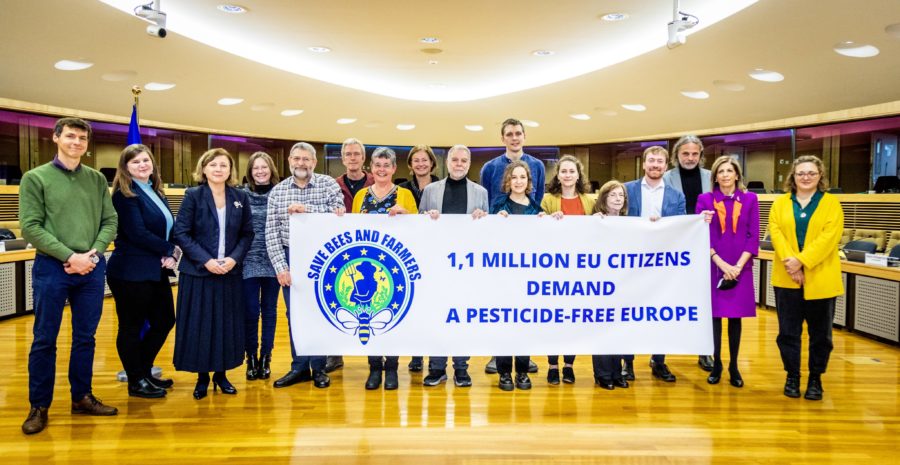
Vice-President Jourová and Commissioner Kyriakides receive Bees ECI demands
On Friday 25 November, representatives of the European Citizens Initiative Save Bees and Farmers delivered a clear message to Vice-President Jourová and Commissioner Kyriakides: we want an end to the war against nature. To restore biodiversity and protect citizens’ health, the use of synthetic pesticides has to be strongly reduced by 2030 and completely phased out by 2035. The EU should support farmers to achieve these goals. This comes at an important moment where the legislative proposal from the the European Commission is under heavy attack by the agro-industry and some EU member states in the EU Council.
Helmut Burtscher-Schaden, a representative of this ECI’s Citizens Committee said: “Fifteen years ago the Commission proposed legislation to reduce the risk and the dependence on pesticides, to protect ecologically sensitive areas, and to substitute more hazardous pesticides with less hazardous ones. Member States and the Parliament agreed to these objectives in 2009 when they adopted the Sustainable Use of Pesticides Directive and Regulation 1107/2009, but Member States subsequently failed to follow the laws they had agreed on. From this background we see it as a fatal signal in terms of democratic policy if some Member States are now trying to torpedo the SUR, trying to delay it or – as is already being speculated in newspapers – try to kill the file.”
The citizens demand a say in this discussion on our health and our environment. Martin Dermine, main representative: “This debate can no longer be dominated by the chemical industry and its allies who lobby in favor of industrial farming. There can be no agriculture and food security without healthy soils, clean water and biodiversity. Industrial chemical agriculture is on a dead-end road.”
Constantin Dobrescu, Romanian beekeeper Romapis, member of the citizens committee: “Every year, thousands of Romanian beekeepers face serious losses of bees in circumstances that are clearly linked to the use of pesticides. The situation is getting worse every year and is linked to the increasingly industrial agriculture practiced in my country.”
Annemarie Gluderer (individual member of the citizens committee): “Our organic farm is surrounded by land that is sprayed a lot because of intensive apple production. Pesticides drifted onto our property, our organic herbs were contaminated with them and could no longer be sold as organic goods. We had to take a lot of protective measures to prevent ourselves from being poisoned. And we, the aggrieved, are accused, threatened with closure, hated and excluded. For us, there is only one solution: a pesticide ban here and now! I ask for it! For our organic farm, as a mother and grandmother for a future for our grandchildren.”
Dr. Polyxeni Nicolopoulo, member of the citizens committee from Greece, environmental pathologist, university of Athens stressed the importance for our health: “We see many cancers and infertility at younger ages, related to pesticide exposure interfering with our hormone system. In utero exposure to pesticides can lead to male infertility and cancer in early age. Bees are sentinels for human health.”
Martin Dermine, main representative of the ECI concludes: “We are over 1 million EU citizens on our way to a toxic free world. We advocate for the restoration of nature, healthy food, healthy soil and clean water, flowers in the fields and biodiversity everywhere in our environment.”
Here you can find the official image of the meeting and here are the representatives of the ECI in front of the Commission building at the Schuman Roundabout in Brussels.
We want a phase-out of synthetic #pesticides to end the war against nature. Representatives of Save Bees and Farmers #ECI delivered 1 Million signatures and a clear message to EU Vice-President @VeraJourova and Commissioner @SKyriakidesEU. https://t.co/cVf97gJZvn pic.twitter.com/aTMXVg0T64
— PAN Europe (@EuropePAN) November 28, 2022
The formal Save Bees and Farmers initiative demands are:
- A phase-out of the use of synthetic pesticides: By 2030 the use of synthetic pesticides shall be gradually reduced by 80% in EU agriculture. By 2035, agriculture in the entire Union shall be working without synthetic pesticides.
- Measures to recover biodiversity: Habitats shall be restored and agricultural areas shall become a vector of biodiversity recovery.
- Support for farmers: Farmers must be supported in the necessary transition towards agroecology. Small, diverse and sustainable farms shall be favoured, organic farming expanded, and research into pesticide-free and GMO-free agriculture will be supported.
The citizens’ initiative is officially validated and the European Commission will have to come with a formal answer. In January an official hearing in the European Parliament will follow.
The delegation visiting the EU Commission:
Dr Polyxeni Nicolopoulo (Greece, medical doctor, individual member of the citizens committee), Annemarie Gluderer (South Tyrol, Italy, organic farmer, individual member of the citizens committee), Constantin Dobrescu (Romania, beekeeper, Romapis and BeeLife), Dr Helmut Burtscher (Austria, scientist, Global2000), Johann Lutke-Schwienhorst (Germany, Aurelia Stiftung), Corinna Hoelzel (Germany, BUND), Veronika Feicht (Germany, Umweltinstitut München), Karl Baer (Germany, former main representative of the citizens committee, now member of the Bundestag), Madeleine Coste (Slow Food EU), Clara Bourgin (France, Friends of the Earth Europe), Luís Morago (Spain, Avaaz), Natalija Svrtan (Croatia, PAN Europe), Tjerk Dalhuisen (Netherlands, PAN Europe) and Dr Martin Dermine (Belgium, PAN Europe).
Background:
The European Citizens Initiative was organised by organisations from all countries in the EU. Signatures with the formally required personal data were collected in all member states. Ten countries reached the minimum threshold set by the EU and the total number of valid signatures makes it an official request on the agenda of the European Commission and Parliament.
Signature collection: in green are the countries where most signatures were collected and that passed the minimum threshold. Out of the total amount of 1,18 million signatures 89% was valid (registration address and date of birth or ID number correct). This results in 1,05 million valid signatures and 11 threshold countries (in dark green).
The official results can be found on the website of the European Commission.
